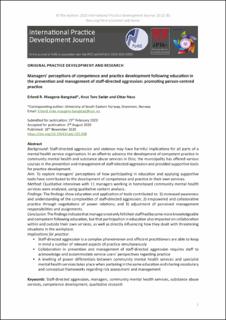| dc.contributor.author | Maagerø-Bangstad, Erlend Rinke | |
| dc.contributor.author | Sælør, Knut Tore | |
| dc.contributor.author | Ness, Ottar | |
| dc.date.accessioned | 2021-04-08T09:15:22Z | |
| dc.date.available | 2021-04-08T09:15:22Z | |
| dc.date.created | 2020-08-03T15:16:25Z | |
| dc.date.issued | 2020 | |
| dc.identifier.citation | Maagerø-Bangstad, E. R., Sælør, K. T., & Ness, O. (2020). Managers’ perceptions of competence and practice development following education in the prevention and management of staff-directed aggression: promoting person-centred practice. International Practice Development Journal, 10(2). | en_US |
| dc.identifier.issn | 2046-9292 | |
| dc.identifier.uri | https://hdl.handle.net/11250/2736802 | |
| dc.description.abstract | Background: Staff-directed aggression and violence may have harmful implications for all parts of a mental health service organisation. In an effort to advance the development of competent practice in community mental health and substance abuse services in Oslo, the municipality has offered various courses in the prevention and management of staff-directed aggression and provided supportive tools for practice development.
Aim: To explore managers’ perceptions of how participating in education and applying supportive tools have contributed to the development of competence and practice in their own services.
Method: Qualitative interviews with 11 managers working in homebased community mental health services were analysed, using qualitative content analysis.
Findings: The findings show education and application of tools contributed to: 1) increased awareness and understanding of the complexities of staff-directed aggression; 2) empowered and collaborative practice through negotiations of power relations; and 3) adjustment of perceived management responsibilities and assignments.
Conclusion: The findings indicate that managers not only felt their staff had become more knowledgeable and competent following education, but that participation in education also impacted on collaboration within and outside their own services, as well as directly influencing how they dealt with threatening situations in the workplace.
Implications for practice:
- Staff-directed aggression is a complex phenomenon and efficient practitioners are able to keep in mind a number of relevant aspects of practice simultaneously
- Collaboration in prevention and management of staff-directed aggression requires staff to acknowledge and accommodate service users’ perspectives regarding practice
- A levelling of power differentials between community mental health services and specialist mental health services takes place when partaking in the same education and sharing vocabulary and conceptual frameworks regarding risk assessment and management | en_US |
| dc.language.iso | eng | en_US |
| dc.rights | Navngivelse-Ikkekommersiell 4.0 Internasjonal | * |
| dc.rights.uri | http://creativecommons.org/licenses/by-nc/4.0/deed.no | * |
| dc.title | Managers’ perceptions of competence and practice development following education in the prevention and management of staff-directed aggression: promoting person-centred practice | en_US |
| dc.type | Peer reviewed | en_US |
| dc.type | Journal article | en_US |
| dc.description.version | publishedVersion | en_US |
| dc.rights.holder | © The Authors 2020. | en_US |
| dc.source.volume | 10 | en_US |
| dc.source.journal | International Practice Development Journal | en_US |
| dc.source.issue | 2 | en_US |
| dc.identifier.doi | https://doi.org/10.19043/ipdj.102.008 | |
| dc.identifier.cristin | 1821395 | |
| cristin.ispublished | true | |
| cristin.fulltext | original | |
| cristin.qualitycode | 1 | |

